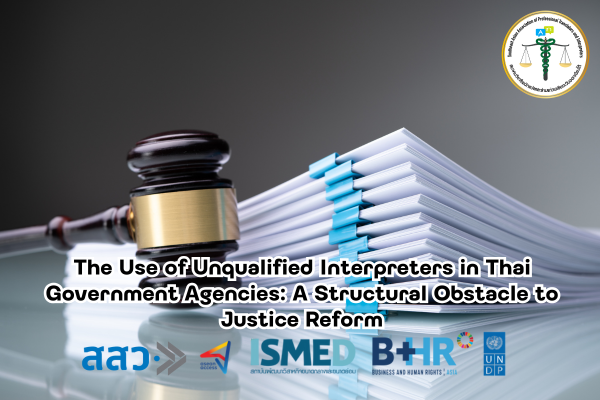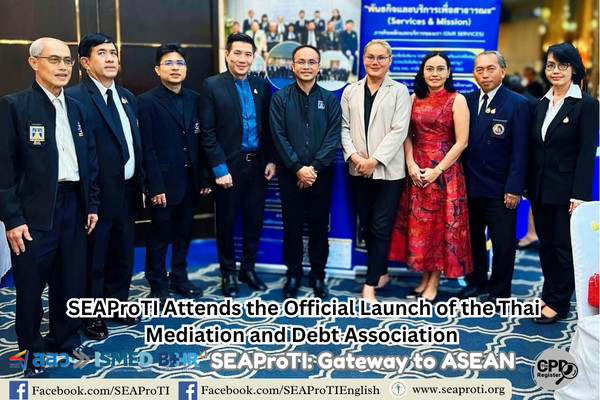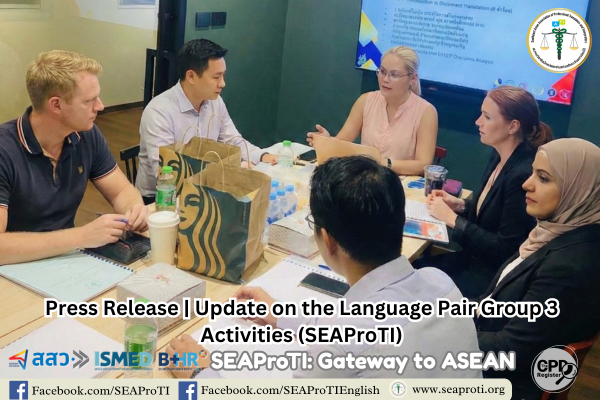The Use of Unqualified Interpreters in Thai Government Agencies:
A Structural Obstacle to Justice Reform
2 May 2025, Bangkok – In the administration of justice, language access is a fundamental human right, especially for those who do not speak Thai as their first language, such as migrant workers, refugees, and ethnic minorities. Providing qualified interpreters is therefore essential. However, many government agencies in Thailand continue to use unaccredited or untrained individuals as interpreters, leading to translation errors that violate the rights of litigants and undermine trust in the judicial process. This issue represents a systemic barrier to the advancement of justice reform in Thailand.
1. Structural Problem: The Lack of Regulatory Mechanisms for Interpreters in State Agencies
While Thailand has professional regulatory bodies for other professions, such as physicians, lawyers, and engineers, it lacks a governmental mechanism to ensure the quality of interpreters in the justice system. In 2024, the Southeast Asian Association of Professional Translators and Interpreters (SEAProTI) introduced Thailand’s first formal certification system for interpreters based on professional standards (SEAProTI, 2024).
Despite this, many state agencies still appoint unqualified individuals to serve as interpreters, often based on their civil servant status or convenience rather than expertise. This has led to inaccuracies in interpretation and has diminished the reliability of legal proceedings.
2. Real-World Consequences
The use of unqualified interpreters results in:
- Mistranslations of testimony, leading to misunderstandings of witness or defendant statements.
- Judicial decisions are based on inaccurate or incomplete information.
- Violations of litigants’ legal rights, particularly the right to a defense.
Research in forensic linguistics has shown that untrained interpreters may use leading or coercive language structures, unintentionally influencing confessions or testimony (Eades, 2010; Coulthard & Johnson, 2007). Studies in countries such as the UK and Australia have demonstrated how the use of unqualified interpreters can lead to wrongful convictions and fundamental human rights violations (Berk-Seligson, 2002).
3. Attitudinal Barriers Within Government Agencies
A key obstacle to change is the institutional mindset among some government agencies, which resist external input and assume that their status as public institutions alone guarantees credibility. There is little willingness to allow oversight by professional bodies or to accept feedback from civil society.
A pervasive misconception is that any bilingual civil servant can serve as an interpreter. This ignores the specialized skill set required, which includes legal terminology, accurate message transfer without distortion, and impartiality in high-pressure settings (Tipton & Furmanek, 2016).
4. Policy Recommendations
To elevate the credibility and integrity of Thailand’s judicial system, urgent measures are needed:
- Enact official regulations requiring the use of certified interpreters—accredited by recognized professional bodies—in all criminal and rights-impacting proceedings.
- Establish a complaint and disciplinary system to investigate interpreter misconduct, including expert review of contested translations.
- Foster partnerships between government agencies and professional associations, such as SEAProTI, to jointly train and qualify interpreters.
- Allocate funding and resources for systematic interpreter training programs within state agencies, ensuring adequate legal and linguistic competence.
Conclusion
The use of unqualified interpreters in government agencies is not a minor oversight but a reflection of deeper systemic issues. It undermines the right to a fair trial and delays justice reform. For Thailand to build a justice system aligned with global standards, it must begin with the professionalization of legal interpreting through policy, regulation, and cooperation with certified bodies.
References (APA Style)
- Berk-Seligson, S. (2002). The bilingual courtroom: Court interpreters in the judicial process (2nd ed.). University of Chicago Press.
- Coulthard, M., & Johnson, A. (2007). An Introduction to Forensic Linguistics: Language in Evidence. Routledge.
- Eades, D. (2010). Sociolinguistics and the Legal Process. Multilingual Matters.
- SEAProTI. (2024). Guidelines for Certified Interpreters and Translators in Southeast Asia. Southeast Asian Association of Professional Translators and Interpreters.
- Tipton, R., & Furmanek, O. (2016). Dialogue Interpreting: A Guide to Interpreting in Public Services and the Community. Routledge.
SEAProTI’s certified translators, translation certification providers, and certified interpreters:
The Southeast Asian Association of Professional Translators and Interpreters (SEAProTI) has officially announced the criteria and qualifications for individuals to register as “Certified Translators,” “Translation Certification Providers,” and “Certified Interpreters” under the association’s regulations. These guidelines are detailed in Sections 9 and 10 of the Royal Thai Government Gazette, issued by the Secretariat of the Cabinet under the Office of the Prime Minister of the Kingdom of Thailand, dated July 25, 2024, Volume 141, Part 66 Ng, Page 100.
To read the full publication, visit: the Royal Thai Government Gazette
ปัญหาการใช้ล่ามที่ไม่มีมาตรฐานในหน่วยงานราชการไทย:
อุปสรรคเชิงโครงสร้างต่อกระบวนการยุติธรรม
2 พฤษภาคม 2568, กรุงเทพมหานคร – ในระบบกระบวนการยุติธรรม การเข้าถึงภาษาเป็นสิทธิมนุษยชนขั้นพื้นฐาน โดยเฉพาะอย่างยิ่งสำหรับผู้ที่ไม่ได้ใช้ภาษาไทยเป็นภาษาแม่ เช่น แรงงานข้ามชาติ ผู้ลี้ภัย และบุคคลจากกลุ่มชาติพันธุ์ต่าง ๆ การจัดให้มีล่ามที่มีคุณสมบัติเหมาะสมจึงเป็นสิ่งจำเป็นอย่างยิ่ง อย่างไรก็ตาม หน่วยงานราชการหลายแห่งในประเทศไทยยังคงใช้ล่ามที่ไม่ได้ผ่านการรับรองหรือไม่มีคุณวุฒิด้านวิชาชีพ ทำให้เกิดความผิดพลาดในการแปลและกระทบต่อสิทธิของคู่ความในคดี ซึ่งกลายเป็นอุปสรรคต่อการพัฒนากระบวนการยุติธรรมไทยในระดับโครงสร้าง
1. ปัญหาเชิงโครงสร้าง: การไม่มีระบบกำกับมาตรฐานล่ามในหน่วยงานรัฐ
แม้ประเทศไทยจะมีหน่วยงานที่ทำหน้าที่ควบคุมคุณภาพวิชาชีพในบางสาขา เช่น แพทย์ พยาบาล หรือทนายความ แต่กลับไม่มีหน่วยงานราชการที่ทำหน้าที่กำกับดูแลมาตรฐานของล่ามในเชิงระบบ จนกระทั่งปี พ.ศ. 2567 ที่สมาคมวิชาชีพนักแปลและล่ามแห่งเอเชียตะวันออกเฉียงใต้ (SEAProTI) ได้เริ่มระบบการรับรองล่ามอย่างเป็นทางการตามมาตรฐานวิชาชีพ (SEAProTI, 2024)
หลายหน่วยงานราชการยังคงแต่งตั้งบุคคลทั่วไปที่ไม่มีคุณสมบัติเป็นล่ามในคดีความ หรือใช้บุคคลที่มีตำแหน่งราชการโดยไม่คำนึงถึงความสามารถทางภาษาและจริยธรรมวิชาชีพ ผลที่ตามมาคือ ความคลาดเคลื่อนในการแปล ความเข้าใจผิดของผู้มีส่วนได้เสียในคดี และการตัดสินคดีที่อาจละเมิดหลักนิติธรรม
2. ผลกระทบที่เกิดขึ้นจริง
การใช้ล่ามที่ไม่มีคุณสมบัติเพียงพอ ส่งผลให้:
- คำให้การของผู้ต้องหา/พยานถูกถ่ายทอดคลาดเคลื่อนจากต้นฉบับ
- ผู้พิพากษาหรือเจ้าหน้าที่รัฐตัดสินใจจากข้อมูลที่ผิดพลาด
- สิทธิในการป้องกันตัวของจำเลยถูกลดทอน
งานศึกษาทางนิติภาษาศาสตร์พบว่า ล่ามที่ไม่ผ่านการฝึกอบรมสามารถใช้โครงสร้างประโยคแบบชี้นำ (leading translation) ซึ่งทำให้เกิดความเข้าใจผิดในคำรับสารภาพหรือคำให้การในศาล (Eades, 2010; Coulthard & Johnson, 2007)
กรณีศึกษาในประเทศออสเตรเลียและอังกฤษต่างแสดงให้เห็นถึงบทบาทสำคัญของล่ามในการส่งเสริมความยุติธรรม และความเสียหายร้ายแรงที่เกิดขึ้นเมื่อใช้ล่ามที่ไม่มีคุณสมบัติเหมาะสม (Berk-Seligson, 2002)
3. ทัศนคติของหน่วยงานรัฐ: อุปสรรคต่อการเปลี่ยนแปลง
ปัญหาเชิงทัศนคติถือเป็นอุปสรรคสำคัญ หน่วยงานรัฐบางแห่งยึดถือความเป็น “องค์กรของรัฐ” และปฏิเสธการตรวจสอบคุณภาพการแปลจากภายนอก ทั้งยังไม่เปิดรับข้อเสนอแนะจากองค์กรวิชาชีพหรือประชาชน
ความเข้าใจผิดที่ว่าข้าราชการทุกคนสามารถเป็นล่ามได้เพียงเพราะ “รู้ภาษา” ยังคงฝังรากลึกในระบบราชการไทย ซึ่งสวนทางกับหลักวิชาชีพด้านล่ามที่ต้องอาศัยทักษะเฉพาะทาง เช่น การตีความกฎหมาย การรักษาความเป็นกลาง และจรรยาบรรณวิชาชีพ (Tipton & Furmanek, 2016)
4. ข้อเสนอเชิงนโยบาย
เพื่อยกระดับมาตรฐานและความน่าเชื่อถือของกระบวนการยุติธรรมไทย ควรมีมาตรการดังต่อไปนี้:
- บัญญัติกฎหมายหรือระเบียบราชการที่กำหนดให้ใช้เฉพาะล่ามที่ได้รับการรับรองโดยหน่วยงานวิชาชีพเท่านั้นในคดีอาญาและคดีที่มีผลต่อสิทธิเสรีภาพ
- จัดตั้งระบบร้องเรียนและสอบสวนกรณีล่ามทำงานผิดพลาด เพื่อคุ้มครองสิทธิของคู่ความ
- จัดให้มีงบประมาณและโครงการฝึกอบรมล่ามสำหรับหน่วยงานรัฐ โดยร่วมมือกับสมาคมวิชาชีพ
- ส่งเสริมการทำงานข้ามภาคส่วน ระหว่างหน่วยงานราชการ ภาควิชาชีพ และภาคประชาชน เพื่อพัฒนาระบบล่ามอย่างยั่งยืน
บทสรุป
การใช้ล่ามที่ไม่มีมาตรฐานในหน่วยงานรัฐไม่ใช่เพียงความผิดพลาดเฉพาะราย แต่สะท้อนถึงโครงสร้างระบบราชการที่ยังไม่เปิดรับมาตรฐานวิชาชีพสากล การปฏิรูประบบล่ามจึงเป็นเรื่องเร่งด่วนที่ต้องดำเนินควบคู่กับการยกระดับกระบวนการยุติธรรมไทยให้เท่าทันนานาประเทศ
เอกสารอ้างอิง (APA Style)
- Berk-Seligson, S. (2002). The bilingual courtroom: Court interpreters in the judicial process (2nd ed.). University of Chicago Press.
- Coulthard, M., & Johnson, A. (2007). An Introduction to Forensic Linguistics: Language in Evidence. Routledge.
- Eades, D. (2010). Sociolinguistics and the Legal Process. Multilingual Matters.
- SEAProTI. (2024). Guidelines for Certified Interpreters and Translators in Southeast Asia. Southeast Asian Association of Professional Translators and Interpreters.
- Tipton, R., & Furmanek, O. (2016). Dialogue Interpreting: A Guide to Interpreting in Public Services and the Community. Routledge.
เกี่ยวกับนักแปลรับรอง ผู้รับรองการแปล และล่ามรับรองของสมาคมวิชาชีพนักแปลและล่ามแห่งเอเชียตะวันออกเฉียงใต้
สมาคมวิชาชีพนักแปลและล่ามแห่งเอเชียตะวันออกเฉียงใต้ (SEAProTI) ได้ประกาศหลักเกณฑ์และคุณสมบัติผู้ที่ขึ้นทะเบียนเป็น “นักแปลรับรอง (Certified Translators) และผู้รับรองการแปล (Translation Certification Providers) และล่ามรับรอง (Certified Interpreters)” ของสมาคม หมวดที่ 9 และหมวดที่ 10 ในราชกิจจานุเบกษา ของสำนักเลขาธิการคณะรัฐมนตรี ในสำนักนายกรัฐมนตรี แห่งราชอาณาจักรไทย ลงวันที่ 25 ก.ค. 2567 เล่มที่ 141 ตอนที่ 66 ง หน้า 100 อ่านฉบับเต็มได้ที่: นักแปลรับรอง ผู้รับรองการแปล และล่ามรับรอง

























